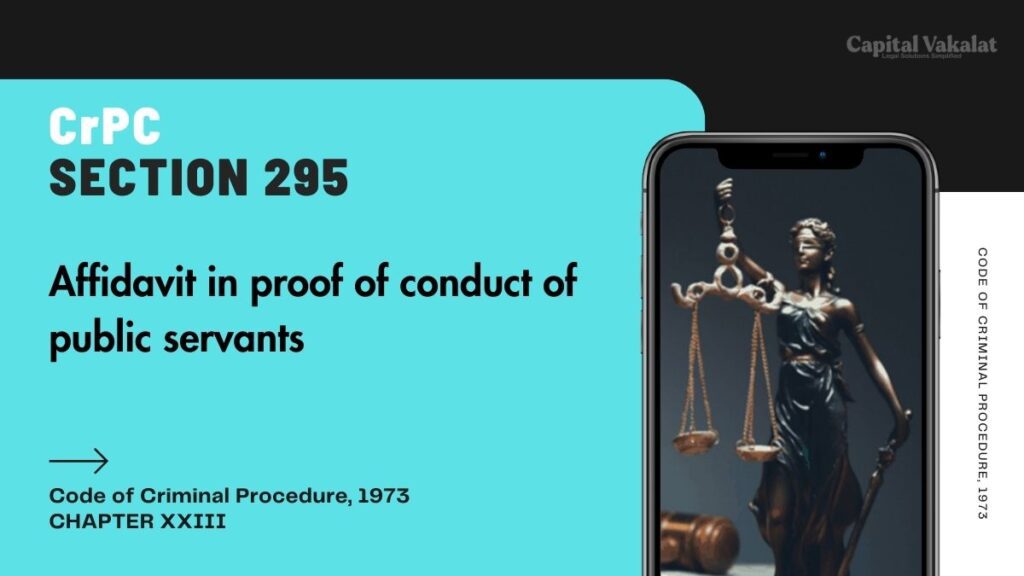Ensuring accountability and transparency in public service is paramount to maintaining the integrity of governance. A critical legal provision in this regard is Section 295 of the Code of Criminal Procedure (CrPC). This section deals with affidavits in proof of the conduct of public servants, serving as a cornerstone in legal proceedings that involve public officials.

This comprehensive article delves into the nuances of Section 295 CrPC, exploring its significance, application, and implications for public accountability.
Bare Act. Section 295 Cr.P.C.
Affidavit in proof of conduct of public servants.
When any application is made to any Court in the course of any inquiry, trial or other proceeding under this Code, and allegations are made therein respecting any public servant, the applicant may give evidence of the facts alleged in the application by affidavit, and the Court may, if it thinks fit, order that evidence relating to such facts be so given.
Understanding Section 295 CrPC
Section 295 of the CrPC primarily deals with the procedure for utilizing affidavits to establish the conduct of public servants. This legal provision is pivotal in criminal cases where the actions of public officials are under scrutiny. The affidavit serves as a formal statement, sworn under oath, to verify facts pertaining to the conduct of these officials.
Importance of Section 295 CrPC
The significance of Section 295 CrPC cannot be overstated. It acts as a mechanism to ensure that public servants are held accountable for their actions. By requiring affidavits, the law promotes transparency and honesty among officials, as their conduct is subject to legal verification. This provision also protects the rights of individuals who might be affected by the actions of public servants, ensuring they have a means to seek justice.
The Legal Framework
The Role of Affidavits in Legal Proceedings
Affidavits play a crucial role in legal proceedings under Section 295 CrPC. They are considered vital pieces of evidence, providing a written statement of facts that can be used in court. The importance of these affidavits lies in their ability to offer a clear, sworn testimony about the conduct of public servants, which can significantly influence the outcome of a case.
Submission and Verification of Affidavits
The process of submitting and verifying affidavits is meticulously outlined in the CrPC. The affidavit must be sworn before a magistrate or an authorized officer, ensuring its authenticity. This step is critical in maintaining the integrity of the affidavit, as it must be a truthful representation of the facts.
Implications for Public Servants
Maintaining Accountability
Section 295 CrPC serves as a deterrent against misconduct by public servants. Knowing that their actions can be scrutinized through affidavits encourages officials to adhere to ethical standards and perform their duties diligently. This provision thus fosters a culture of accountability within public services.
Protecting Public Interest
The requirement for affidavits under Section 295 CrPC also safeguards public interest. It ensures that any misconduct by public servants can be formally challenged and verified in a court of law. This mechanism is essential for protecting the rights of citizens and maintaining public trust in governance.
Challenges and Criticisms
Complexity of Legal Procedures
One of the primary challenges associated with Section 295 CrPC is the complexity of legal procedures involved in submitting and verifying affidavits. The process can be daunting for individuals who are not well-versed in legal matters, potentially hindering access to justice.
Potential for Misuse
While Section 295 CrPC aims to promote accountability, there is also a risk of misuse. Affidavits can be falsely sworn, leading to wrongful accusations against public servants. This potential for misuse necessitates stringent verification processes to ensure the authenticity of affidavits.
Best Practices for Implementing Section 295 CrPC
Training for Public Servants
To effectively implement Section 295 CrPC, it is crucial to provide comprehensive training for public servants. This training should focus on ethical conduct, the importance of transparency, and the legal implications of affidavits in proving conduct. By educating officials, the likelihood of misconduct can be minimized.
Streamlining Legal Procedures
Simplifying the procedures for submitting and verifying affidavits can enhance the accessibility of justice under Section 295 CrPC. Providing clear guidelines and support for individuals involved in these legal processes can ensure that affidavits are used effectively to uphold accountability.
Ensuring Fair Verification
To prevent the misuse of affidavits, robust verification mechanisms must be in place. This includes thorough checks by magistrates or authorized officers to confirm the authenticity of the affidavits. Ensuring fair and unbiased verification is essential for maintaining the integrity of the legal process.
Section 295 CrPC in Practice
Case Studies
Examining real-life cases where Section 295 CrPC has been applied provides valuable insights into its practical implications. These case studies highlight how affidavits have been used to establish the conduct of public servants and the outcomes of such legal proceedings.
Impact on Public Trust
The implementation of Section 295 CrPC has a profound impact on public trust in governance. By holding public servants accountable and ensuring transparency, this provision reinforces the public’s confidence in the justice system. Trust is a crucial element in the relationship between the government and its citizens, and Section 295 CrPC plays a vital role in fostering this trust.
Conclusion
Section 295 CrPC stands as a testament to the commitment towards transparency and accountability in public service. By mandating the use of affidavits to prove the conduct of public servants, it upholds the principles of justice and integrity. While there are challenges in its implementation, the overall impact of this provision is undeniably positive, reinforcing public trust and promoting ethical conduct. As we move forward, continuous efforts to streamline procedures and ensure fair verification will further strengthen the effectiveness of Section 295 CrPC in maintaining the integrity of public service.